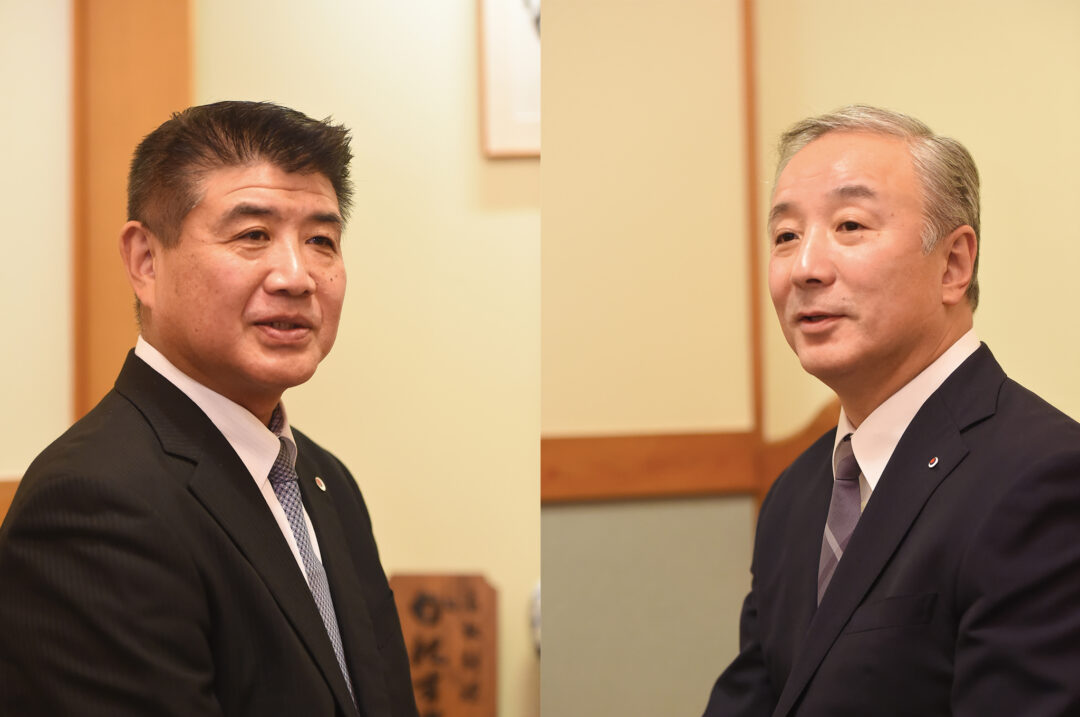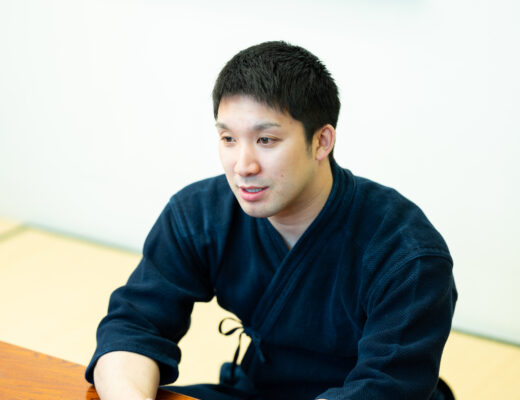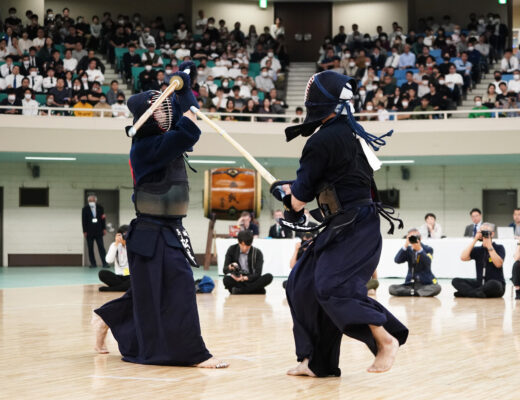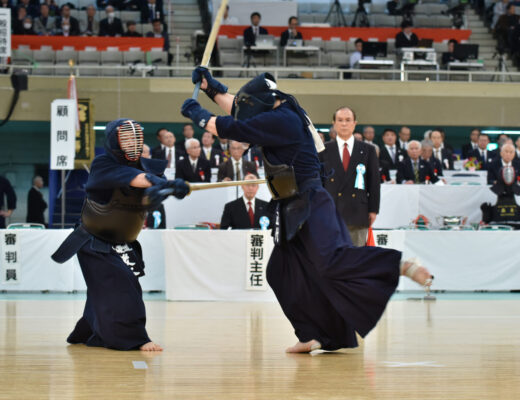2021.1 KENDOJIDAI
The All Japan Kendo Championship, which defines the best Kendo in Japan, has been postponed. This is the first time since the first championship was held in 1953. We asked some of the past winners of the tournament about their memories of the event and what they have learned throughout.
Unique dialogue between Ishida Toshiya and Miyazaki Masahiro Sensei
Kenyu (Kendo friends) who improve each other
It was about 30 years ago.
As the turbulent Showa era came to a close and the time shifted to the Heisei era, the All Japan Kendo Championship to determine Japan’s best Kenshi began to revolve around two outstanding figures: Ishida Toshiya and Miyazaki Masahiro, both of whom continue to make their presence felt to this day.
We look back on their active years, focusing on the All Japan Championships.
Ishida Toshiya, 8th Dan Kyoshi
Born in Osaka in 1961. He graduated from PL Gakuen High School and went on to study at Osaka University of Health and Sport Sciences before joining the Osaka Prefectural Police. His major achievements include winning the All Japan Championship twice, the National Police Championship team and individual titles, the WKC team title, the All Japan Invitational 7th Dan Championship title, and the All Japan Invitational 8th Dan Championship title. He was the coach of the Japanese men’s team at the 16th and 17th WKC. He currently holds the position of Dean of the College of Arts and Sciences at the National Police Academy.
Miyazaki Masahiro, 8th Dan Kyoshi
Born in 1963 in Kanagawa Prefecture. After graduating from Tokai University Sagami High School, he joined the Kanagawa Prefectural Police. His major achievements include winning the All Japan Championship 6 times, the WKC Individual title, the National Police Championship team and individual titles, the World Championship Team title, the All Japan Invitational 7th Dan Championship title, and the All Japan Invitational 8th Dan Championship title. He was the coach of the Japanese women’s national team at the 15th and18th WKC. He is currently the Chief Instructor of Kendo at Kanagawa Prefectural Police.
“Miyazaki Sensei has everything that I don’t have.” – Ishida
– Thank you for gathering here today. This year, the All Japan Championships were postponed due to Coronavirus. Therefore, I would like to ask both Sensei, who have been at the top of the world of Kendo from their days as competitors to the present, to talk about their active days, focusing on the All Japan Championships. First of all, when was the moment when you first became aware of the All Japan Championships?
Ishida: I first became aware of the All Japan Championships when I was in elementary school. I went to a very active Dojo, so I had a very high awareness of Shiai. I watched the All Japan Championships on TV, and I still remember writing on the wall of the bathroom at home, “I will participate in the All Japan Championships”. At that time, I felt that it was my dream for the future, but it wasn’t until I joined the Osaka Prefectural Police that I actually set my goal to win the championship.
Miyazaki: It was in my third year of high school. I had the opportunity to watch the All Japan Championships at the Nippon Budokan for the first time. A classmate of my coach at Tokai University Sagami High School was participating in the tournament, and I was there to cheer him on. When I watched it on TV, I had a distant image of it, but when I saw it in reality, it was a tremendous experience. It was also the time when I was thinking about my career path after graduation, and I decided to follow my impulse and go to Kanagawa Prefectural Police.
– In order to participate in the All Japan Championships, you decided to work for the Kanagawa Prefectural Police?
Miyazaki: Yes. If you look at the All Japan Championships program, most of the competitors from Kanagawa Prefecture were from the prefectural police. My instructor at the prefectural police at the time invited me to join the prefectural police and told me that he would train me to participate in the All Japan Championships. I forgot that I was not good enough at the time and mistakenly thought that one could participate in the All Japan Championships if they went to the prefectural police. However, I myself was convinced that continuing Kendo at the prefectural police was the best way to get to the All Japan Championships, so I decided to indebt myself to their care.
– Are there any players that you admired at the time?
Ishida: I have the impression that teachers were more active in those days, such as Uda Kojiro, the winner of the 24th, and Toyama Mitsutoshi, the winner of the 28th championship. I also remember Yokoo Eiji, the winner of the 22nd. I had an encounter with Yokoo Sensei. A few years after I joined the Osaka Prefectural Police, I was taken to a Keiko session in Wakayama by my then supervisor, Kosaka Tatsuaki sensei, and asked Yokoo Sensei for Keiko. At that time, I had won the Police Championship and had some confidence but when I asked Yokoo Sensei to train, he treated me like a child. I was impressed by his depth of strength, competitive instincts, and skillful tactics, and I realized that this kind of person could become the best in Japan. When Kosaka Sensei asked Yokoo Sensei, “He is our best newcomer, what do you think?” He implied I still had a long way to go. I vividly remember that exchange. I made up my mind that I would ask him for Keiko again in 10 years.
Miyazaki: The first time I watched the All Japan Championships on TV, Yamada Hironori Sensei of Kumamoto won the championship. The final Shiai against Arima Mitsuo Sensei is still etched in my mind. When Ukita Sensei won, the Shiai was over in a flash, and I thought he was a genius in Kendo. Nishikawa Kiyonori Sensei was also very active and was one of another Kendoka I admired.
– When did you first become aware of each other?
Ishida: We are one year apart in age, but it was after I joined the Osaka Prefectural Police that I became aware of Miyazaki sensei. Every year, the Kanagawa Prefectural Police would come to visit us, and when I saw Mr. Miyazaki Sensei’s Shiai, I felt his strength. The year I joined the prefectural police, he was already in the finals of the police championships, and this Shiai also shook me. My seniors in the prefectural police told me that I would eventually face Miyazaki, and I naturally became increasingly aware of him.
Miyazaki: I’ve been watching Ishida Sensei since I was at PL Gakuen High School. He was very strong both in high school and in university. What shocked me the most was when he won the Police Championship on his first appearance. I had competed in the Police Championship before him, but when I saw him win the title in his first year, I was reminded once again of his strength. Even more so when he was up against such difficult opponents as Terachi Tanetoshi and Nishikawa Sensei. I began to strongly consider it as my goal to one day cross swords with Ishida Sensei.
– Your rivalry has been praised in the past, but how did it feel in reality?
Ishida: I think rivalry is something that other people see and feel, not us. Later on, Miyazaki Sensei set an unbeatable record and I felt the joy and pleasure of competing with such a person in my generation. I think this relationship has continued even now that I am no longer active and have become an instructor. I would like to cherish this relationship as a lifelong Kenyu.
Miyazaki: I can’t think of him as a rival. Ever since I saw him win the police championship, he has set an ideal for me. I have won some Shiai and lost others, but I have always tried to keep up with him and to tell you the truth, I don’t want to fight him. However, I think I am where I am today because I was able to have Shiai like that. So I am very grateful to Ishida Sensei.
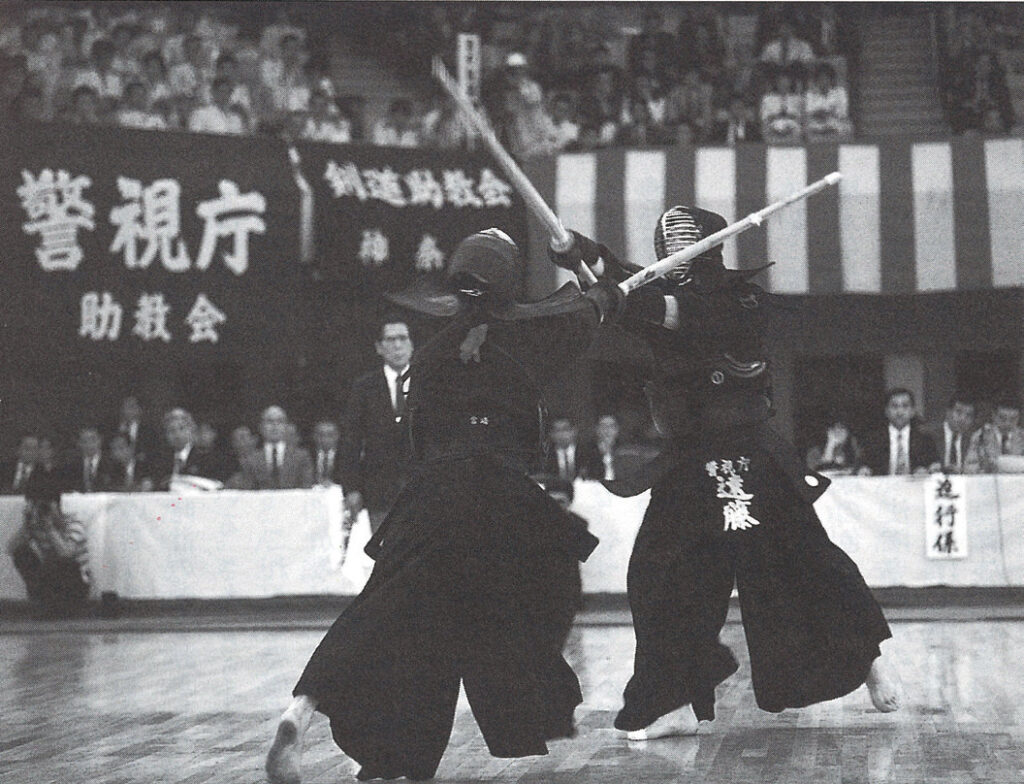
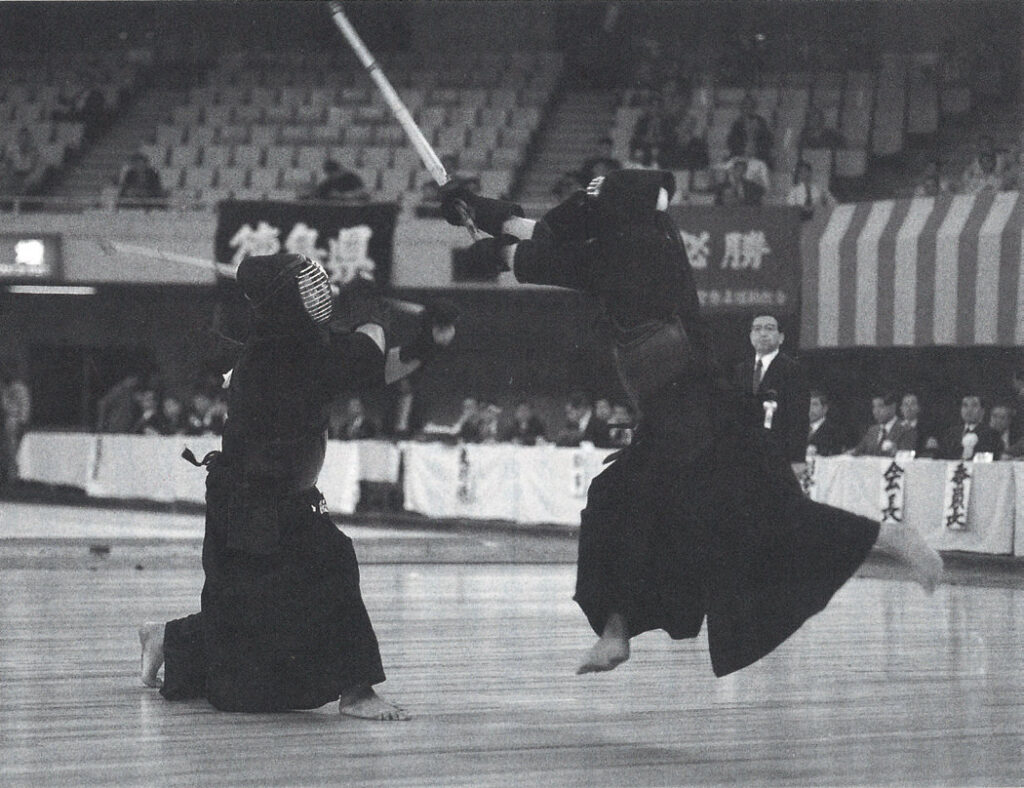
– Is the feeling of not wanting to lose against each other stronger than when fighting other competitors?
Ishida: I think I have approached all my fights with the same feeling, but when I was fighting Miyazaki sensei, I felt that I was strangely on fire, exerting myself, in my own world more often than not. I’m sure I felt the same way when fighting other fighters, but I felt a special kind of tension before I even entered the Shiai hall.
Miyazaki: As I mentioned earlier, I don’t want to fight Ishida Sensei if I can help it. Whenever I lose a fight, I always feel frustrated, but when I lose to Ishida Sensei, I don’t feel that way. Maybe it’s because I’m throwing myself at him when going into the fight. It is difficult to win against Ishida Sensei even if you put everything you have into it, but by doing so and losing you can honestly say it was inevitable.
Ishida: In my Shiai with Miyazaki sensei, the challenge was how to overcome my fear. I would get hit if I was just standing still, and I would be even more afraid if I got into Maai. However, I thought that if I did not compete on the edge, I would not be able to win. Miyazaki Sensei is the only competitor like that.
Miyazaki: I feel the same way. I cannot make the final entry to perform techniques with abandon. One Sensei once taught me that it’s hard to get in Maai with a strong opponent. There was a time when I thought, out of youthful indiscretion, that this was not true. However, when I had a Shiai with Ishida Sensei, this was exactly right. There was a fear of being hit if I went in too far, so I would repeatedly go in and out and miss the opportunity. I got the impression that the battle for Maai of the spacing was always more intense.
– It was like a conversation through the Shinai that only the two of you could understand?
Miyazaki: I love Ishida Sensei’s big and fair Kendo and I am more conscious of it because of that. Maybe it is the longing to do Kendo like Ishida Sensei that makes me more conscious.
Ishida: Miyazaki Sensei has everything that I don’t have, he can do everything that I want to do. I think that is why he was able to achieve the feat of winning consecutive titles, something no one had ever done before. As we crossed Shinai, I realized that I could not do what Miyazaki Sensei does, so I decided to do my own Kendo.
“Being selected as a representative of Japan, I was able to join the national team.” – Miyazaki
– Moving on to the All Japan Championships, I think there was a period of about seven years during which both of you were unable to participate in the championships because of the Dan restriction at that time. What was your experience in the Tokuren at that time?
The rest of this article is only available for Kendo Jidai International subscribers!

